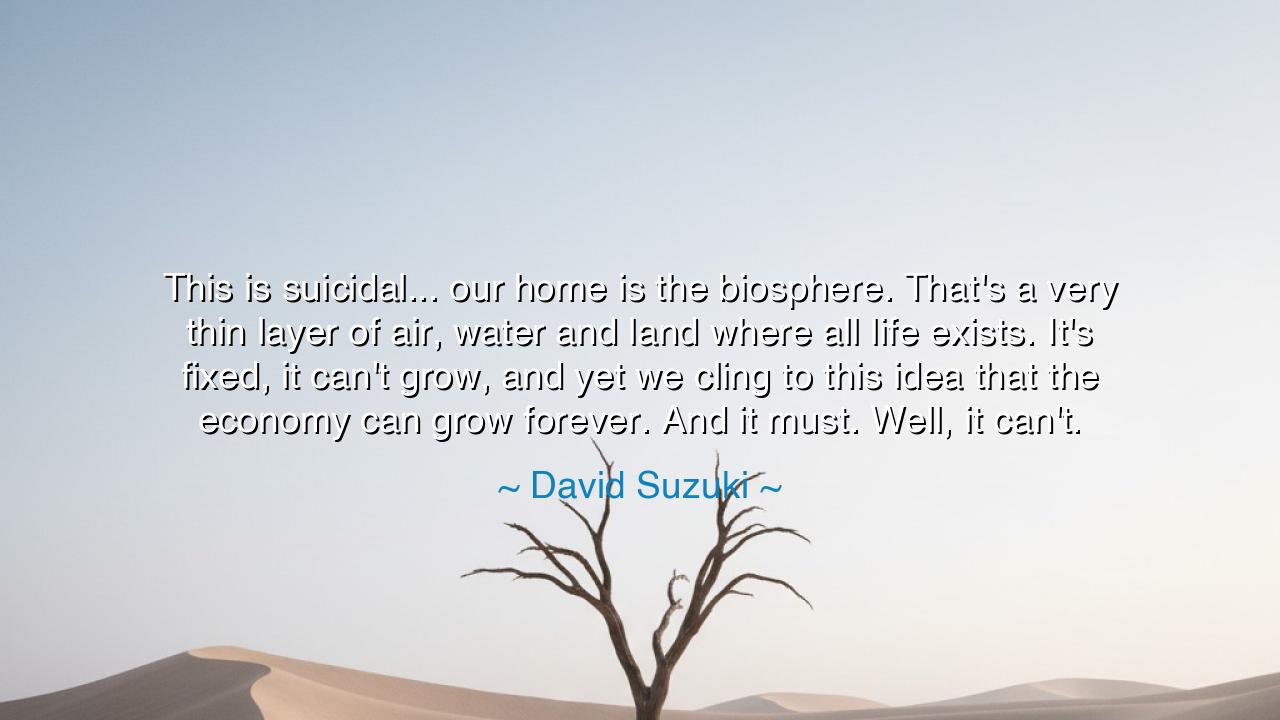
This is suicidal... our home is the biosphere. That's a very thin
This is suicidal... our home is the biosphere. That's a very thin layer of air, water and land where all life exists. It's fixed, it can't grow, and yet we cling to this idea that the economy can grow forever. And it must. Well, it can't.






In the council hall of our descendants, let this be read aloud with care: David Suzuki cries, “This is suicidal… our home is the biosphere. That’s a very thin layer of air, water and land where all life exists. It’s fixed, it can’t grow, and yet we cling to this idea that the economy can grow forever. And it must. Well, it can’t.” Hear how the words strike like a staff upon stone. He names the roof and the floor of our dwelling, the narrow breath between ocean dark and cosmic cold, and he warns that to demand endless more from a bounded house is to set fire to the rafters that shelter us.
The ancients would have understood this warning. They knew a city’s walls were not infinite; granaries had limits; the harbor held only so many ships before it silted and soured. By calling the biosphere a thin layer of air, water and land, Suzuki speaks an old wisdom in modern tongue: the cradle is finite. To treat a finite cradle as an infinite mine is to mistake miracle for merchandise. When he says the biosphere is fixed and can’t grow, he is not despising abundance; he is locating it. Abundance lies in cycles that return—rain to river, leaf to soil—not in a straight line that never ends.
The spell we must break is the idolatry of the line that rises forever—the graph of economy and appetite, praised as if it were a sunrise that never peaks. But the earth’s great accounting is circular: what is taken must be paid back in time, or the debt comes due as flood, as flame, as famine. The claim that we “must” grow forever is a tale told by those who forgot the orchard’s law: more fruit than branches can bear breaks the tree. Suzuki’s last words—“it can’t”—are not pessimism; they are the release of a fever, the return of reason to a world entranced.
Let a story be set before the young. In the twentieth century, the Aral Sea—once the fourth-largest lake on earth—was fed by two generous rivers. For the sake of cotton wealth, those rivers were hacked into canals, their waters drafted for fields without heed to return. The ledgers of the economy swelled; villages hummed. Then the shoreline ran backward; harbors stranded their boats on salt; the wind learned a new cruelty, lifting powdered seabed into lungs and wheat alike. Fish vanished; work vanished; a local climate faltered. Here is Suzuki’s parable in human scale: where the biosphere is treated as a bank that never closes, the final audit is paid in tears.
Or recall the astronauts who turned their cameras earthward and sent us our first full portrait: a blue coin in blackness, ringed by that delicate band of weather and breath. “All life exists” there, within that luminous veil. The image struck prophets dumb and made merchants thoughtful. From that vantage the boast of “forever growth” sounds like a child demanding more rooms in a boat already at sea. Wisdom says: strengthen the hull, ration wisely, mend nets, share catch—do not cut new doors below the waterline and call it progress.
From Suzuki’s warning we draw a clean lesson: to secure our future, we must trade the myth of quantity without end for the practice of quality within bounds. Let us measure wealth not by how much we extract, but by how well we restore; not by what we spend, but by what we can sustain; not by the speed of the wheel, but by the health of the garden it rolls through. To honor a fixed biosphere is not to embrace poverty—it is to discover sufficiency as a noble art.
Therefore, adopt rites worthy of a lasting people. Design economies that fit inside ecosystems: cap extraction at what cycles can replenish; make waste the raw material of tomorrow; prefer durability to disposability. Rewrite the scorekeepers: alongside GDP, keep ledgers of soil life, river clarity, bird-song, and human well-being; if the economy rises while the living ledger falls, declare loss, not victory. Restore the commons—reefs, forests, floodplains—so that nature’s interest can pay our needs without touching her capital. Choose sufficiency: energy from sun and wind, cities built for feet and transit, diets that spare forests and waters. Teach children to love repair more than replacement, and to count success by the quiet thriving of places they will one day inherit.
If we do these things, the charge of “suicidal” will fade like smoke in morning wind. If we refuse—if we demand that a thin layer of air, water and land carry an economy that must grow forever—then history will read our ledgers and write a brief epitaph: “They knew it can’t, and still they tried.” Choose, then, the older courage: to live within a limit as within a covenant. For the covenant keeps us—and, kept by it, we may yet keep the world.






AAdministratorAdministrator
Welcome, honored guests. Please leave a comment, we will respond soon